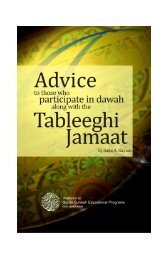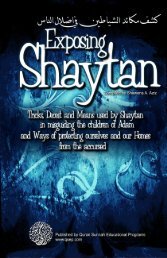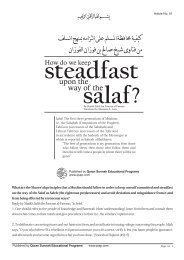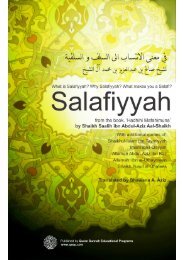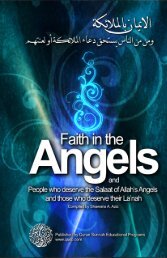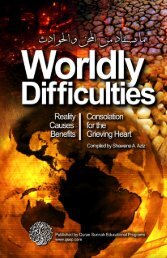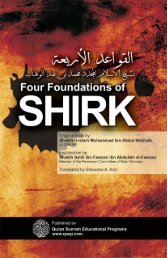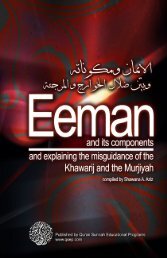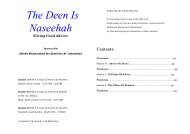- Page 1 and 2:
The JAMAAT TABLEEGH and the Deoband
- Page 3:
Acknowledgements I sincerely thank
- Page 6 and 7:
1. Tawheed ar-Ruboobiyyah: Belief i
- Page 8 and 9:
Deobandi View: (4) - The Messengers
- Page 10 and 11:
The Majzoob is useless even to Sufi
- Page 12 and 13:
Analyzing the Deobandi Claims and C
- Page 15 and 16: Foreword Indeed, all praise is due
- Page 17: As the discussion in this book will
- Page 21 and 22: Bismillah ar-Rahmaan ar-Raheem Intr
- Page 23 and 24: 3. Innovations in Beliefs and Worsh
- Page 25 and 26: Hadeeth shows the gravity of imitat
- Page 27: would be worshiping Allah in the wa
- Page 31 and 32: Chapter 1: Overview and Background
- Page 33 and 34: (propagation) be mine, so that this
- Page 35 and 36: The Training Manual of the Jamaat T
- Page 37 and 38: described as a perfect Muslim” 42
- Page 39 and 40: Vedantic schools. By that time, the
- Page 41 and 42: morsel, his state began to change.
- Page 43 and 44: starvation. He would break fast onl
- Page 45 and 46: These abovementioned examples show
- Page 47 and 48: The Importance of Aqeedah to the Su
- Page 49 and 50: innovators) and Wahabi, live in pea
- Page 51: others to other than my way, you wi
- Page 55 and 56: Chapter 2: The Islamic Concept of T
- Page 57 and 58: ing us closer to Allah.” 82 Calli
- Page 59 and 60: The Essence of Shirk in Tawheed al-
- Page 61 and 62: you all made it Halaal?” He repli
- Page 63: Tawakkul in Him.” 107 “And put
- Page 68 and 69: comprehend Wahdat al-Wajood. But in
- Page 70 and 71: the battle of Badr - Nay, even more
- Page 72 and 73: 1. Moulana Muhammad Qasim, the foun
- Page 74 and 75: From Irshaadul-Mulook, “To the Su
- Page 76 and 77: 1. Moulana Ashraf Ali Thanvi says a
- Page 78 and 79: outward and the other inward. My ou
- Page 80 and 81: Halaal to a man while his sister is
- Page 82 and 83: Refutation of Wahdat al-Wajood in l
- Page 84 and 85: includes filth and dirty places. No
- Page 86 and 87: Knowledge are in every place.” He
- Page 88 and 89: wisdom’. The end of this experien
- Page 90 and 91: The Hindu view of ritualism is that
- Page 93 and 94: Introduction Chapter 4: Life of the
- Page 95 and 96: memorials, and subsequently led the
- Page 97 and 98: did not grant to any human immortal
- Page 99 and 100: The Sufis have many self-contradict
- Page 101 and 102: 3. “Abu Saeed Khazzaaz says that
- Page 103 and 104: Clarifying Doubts: Doubt (1): Allah
- Page 105 and 106: (tomb) of Hazrat Haji Sahib (Dhaami
- Page 107 and 108: Deobandi View - 2: The Prophet is
- Page 109 and 110: This Hadeeth is a clear proof that
- Page 111 and 112: 2. A virtuous man once sat down nea
- Page 113 and 114: souls of the other believers come t
- Page 115 and 116: (2) Limitations to the Hearing A li
- Page 117 and 118:
This line of reasoning is proved wi
- Page 119 and 120:
This shows the firm belief of the S
- Page 121 and 122:
Hasan Ibn Salih… Hasan said: ‘L
- Page 123 and 124:
(d) Asking for Rain During the life
- Page 125:
The JAMAAT TABLEEGH and the Deoband
- Page 128 and 129:
graves, but now you should visit th
- Page 130 and 131:
so, his (i.e. the Prophet’s) grav
- Page 132 and 133:
This Hadeeth again is very clear in
- Page 134 and 135:
(c) The narrations mentioned in Faz
- Page 137 and 138:
Chapter 6 Back from the Barzakh Can
- Page 139 and 140:
wherever we like.” Their Lord ask
- Page 141 and 142:
Ultimately, they lead people toward
- Page 143:
Chapter: 7 Waseelah The JAMAAT TABL
- Page 146 and 147:
worshiped them.” 314 Al-Hafidh Ib
- Page 148 and 149:
Once, the Messenger of Allah saw a
- Page 150 and 151:
did not descend from his minbar (pu
- Page 152 and 153:
Waseelah of Dogs: Moulana Zakariyah
- Page 154 and 155:
And when the Messenger of Allah as
- Page 156 and 157:
me and in a vision I saw Rasoolulla
- Page 158 and 159:
Allah. Likewise, Abu Haneefah and M
- Page 160 and 161:
This Hadeeth does not prove Tawassu
- Page 163:
The JAMAAT TABLEEGH and the Deoband
- Page 166 and 167:
know what is their (slaves) right u
- Page 168 and 169:
Following is a detailed explanation
- Page 170 and 171:
(4) Dhikr in Isolation and Seclusio
- Page 172 and 173:
you. I am just a mirror. The way yo
- Page 174 and 175:
worship insufficient and said: ‘W
- Page 176 and 177:
Kufr in this state, like the saying
- Page 178 and 179:
obligations which are waived for hi
- Page 180 and 181:
More Heretical Beliefs of the Sufis
- Page 182 and 183:
were presented and the beast began
- Page 184 and 185:
shoelaces Taqdees (proclaiming Alla
- Page 186 and 187:
Islam teaches moderation in all asp
- Page 189 and 190:
Chapter 9: Knowledge of the Ghayb (
- Page 191 and 192:
guidance from Allah, the Most High,
- Page 193 and 194:
they will remain alive. Name one As
- Page 195 and 196:
From these Ahaadeeth it is clear th
- Page 197 and 198:
see him in a dream, not every clai
- Page 199 and 200:
2. Moulana Zakariyah says: “Once
- Page 201 and 202:
magnificent throne and claimed to b
- Page 203 and 204:
3. The innovation of wandering into
- Page 205 and 206:
and if there is any such person amo
- Page 207 and 208:
inspirations contradict the Sunnah
- Page 209 and 210:
“Woe to those who write the book
- Page 211 and 212:
them with My own Hands and sealed,
- Page 213 and 214:
Moulana Zakariyah mentions in Fazaa
- Page 215 and 216:
of Sufism. So we may not find clear
- Page 217 and 218:
Gungohi would comment. But Hazrat I
- Page 219 and 220:
Salaat.” Although, he advised me
- Page 221 and 222:
them word of similar import. Their
- Page 223 and 224:
Wali those who dwell in a lofty sta
- Page 225 and 226:
Shaikh, the Mureed receives knowled
- Page 227 and 228:
Messenger of Allah could neither b
- Page 229:
of Umar when he called upon the Sa
- Page 233 and 234:
Chapter 10: Excessive Praise for th
- Page 235 and 236:
Fazaail-e-Aamaal and Exaggeration i
- Page 237 and 238:
composed a few couplets for me and
- Page 239 and 240:
him with, nor did he describe hims
- Page 241 and 242:
The Messenger of Allah said: “If
- Page 243 and 244:
sticking to authentic sources of Is
- Page 245:
The JAMAAT TABLEEGH and the Deoband
- Page 248 and 249:
Moulana Ashraf Ali Thanvi says, “
- Page 250 and 251:
Total Unconditional Obedience to a
- Page 252 and 253:
Aashiq Ilahi Meerathi mentions in t
- Page 254 and 255:
Consequences of not blindly followi
- Page 256 and 257:
Shaikh 605 , just as he cannot appe
- Page 259:
The JAMAAT TABLEEGH and the Deoband
- Page 262 and 263:
Taqleed according to the Deobandis
- Page 264 and 265:
Tabioon learned the religion from t
- Page 266 and 267:
is unacceptable to the Deobandis. I
- Page 268 and 269:
“When a person switches from one
- Page 270 and 271:
derive a ruling from the Sharee’a
- Page 272 and 273:
Examples of the Deobandis giving pr
- Page 274 and 275:
“…and nowadays Hanafee jurists
- Page 276 and 277:
1: Imam Abu Haneefah (rahimahullah)
- Page 278 and 279:
“(Belief in) … Taqleed is essen
- Page 280 and 281:
opinion of the other Imam is more s
- Page 282 and 283:
Imam resorted to Qiyas and Ijtihad
- Page 284 and 285:
oppose their demented minds. They u
- Page 286 and 287:
The books that the Deobandis have w
- Page 288 and 289:
the Ta’weel (false interpretation
- Page 291 and 292:
Appendix Appendix 1: Origin of the
- Page 293 and 294:
Appendix 2: Authenticity of the Aha
- Page 295 and 296:
considered in Islam as great sins.
- Page 299 and 300:
Bibliography 1, A.A Tabari, The Oth
- Page 301 and 302:
22, Dr. Ismail Mangera, Good Charac
- Page 303 and 304:
43, Maulana Muhammad Zakariyah Kand
- Page 305 and 306:
65, Moulana Muhammad Ra’ees Nadwi
- Page 307 and 308:
87, Shabbir Ahmed Usmani, Tafseer-e



